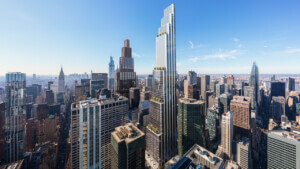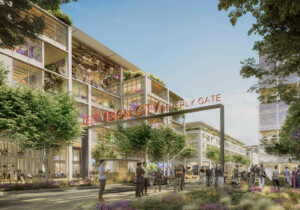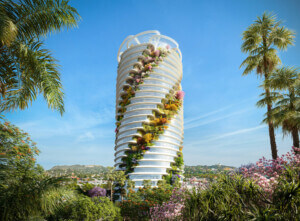This year, the Europe-based New Cities Foundation is bringing its annual New Cities Summit to the Dallas Arts District, from June 17 to 19. Eight hundred global thought leaders will convene at the Winspear Opera House to listen to speakers, engage in workshops, and take advantage of world-class networking opportunities. The Architect’s Newspaper is one of the summit media partners. AN Southwest editor Aaron Seward recently spoke to Mathieu Lefevre, the Executive Director of the New Cities Foundation, about what the organization has on tap for this year’s summit, whose theme is Re-imagining Cities: Transforming the 21st Century Metropolis.
Aaron Seward: Let’s start by getting some background on the New Cities Summit. What is it? Why did it start? And what does it hope to achieve?
Mathieu Lefevre: The New Cities Summit started when the New Cities Foundation was set up, in 2010. It’s a non-profit whose mission is to make cities better. The event is aimed at shaping the global conversation and adding to the creative thought leadership surrounding how to shape what we are calling the Century of Cities. We held the first summit in 2012 in Paris; then we went to São Paulo, Brazil, in 2013; and this year we’re coming to Texas.
Why has the summit decided to come to Dallas this year?
First of all, there is often a herd mentality when it comes to these events. They tend to happen in very similar cities, like New York or Singapore. We’ve always wanted to go to unexplored terrain, to find cities that are full of potential but are facing major challenges. And that’s why we’re interested in Dallas. It’s one of the most dynamic cities in the world. I read somewhere that the GDP of Dallas is larger than that of the United Arab Emirates with all their oil. As much media reporting has covered in recent weeks, it’s extraordinary in terms of its economy and diversity of jobs, but it also faces a lot of challenges. Traffic, for example, is a major issue in this extremely car-dependent city, though that is slowly changing. I also like that Dallas is a place that is eager to tell its story again. That was our inspiration for the theme of this year’s summit: Re-imaging Cities. The theme came from conversations we had in Dallas, and I’m interested in bringing our community there because it’s a city that most of them don’t know.
The summit will be held in the Dallas Arts District. Why this choice of location? What is the relationship between culture and the subject matter discussed at the summit?
The first reason is that it’s a spectacular venue. The participants are going to be absolutely wowed by the arts district as an emerging neighborhood, but also by the building itself, the Winspear Opera House (Foster + Partners, 2009). More broadly, many cities around the world—like Hong Kong, Abu Dhabi, Dallas, and other cities in North America— are betting on culture as a transformative strategy. Dallas is attempting to tell its story again, and to re-imagine itself, partly through its Arts District. I’m a Parisian. I’m sorry to say I had no idea that there was this kind of culture in Texas. Between the Dallas Arts District—the Winspear and the other cultural facilities on that street—and what’s going on in Fort Worth, that’s world-class cultural facilities.
The mayors of Fort Worth and Dallas will be on hand to speak. What other notable figures are participating in the summit?
What I’m really excited about and very proud of is the combination of well known visible figures that come and share their wisdom and insights. We’ve got seven or eight mayors, from Spain, Asia, Africa, and North America of course. Also we’ve got very well known figures, like the architect Daniel Libeskind; the CEO of Bombardier, Lutz Bertling; the CEO of the Dallas/Fort Worth Airport, Sean Donohue; and the executive director of the Mori Foundation, Hiroo Ichikawa, which is one of the most powerful organizations in Japan. We’ve got some great young leaders coming, like Aaron Hurst of the Taproot Foundation & Imperative; and the contemporary Chinese artist Huang Rui. Then there are the speakers from our WhatWorks series, who each get six minutes to tell us about a project that has worked in their city. And of course we’ve got our three AppMyCity! finalists. We’re really excited about meeting the creators of these apps. There is one called Djump, a peer-to-peer car sharing service; one called Peerby that allows people to share household items, like blenders or anything else; and then there’s Social Cyclist, from New York, an app that encourages users to offer preferred bike routes.
What are some of the key topics that will be discussed?
We’re going to map out a future of what we call the Century of Cities: What are the 10 drivers that are going to shape the future of cities? Then we have more technical and pragmatic sessions: How can technology help cities reach their green targets? We’re going to look at emerging concepts in urban design, such as happiness, wellness, and the shared economy. These are just starting to emerge, and we’re going to explore them with many of the people who helped start them. We’re going to talk about mobility. We’re going to talk about entrepreneurship. We’re going to talk about the role of the airport in city strategy. Were going to talk about where the money is going to come from. We’re going to talk about participation, transparency, and citizen engagement in urban democracy. We’re going to talk about healthcare. Of course, a lot of the conversation is going to happen outside of our programs, in the interactions between our many invited attendees. When you bring 800 people from around the world together who have a passion about cities it’s going to result in stimulating creative conversation. I hope it will have tangible results for Dallas and other cities around the world.










